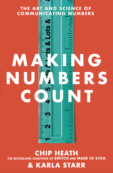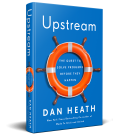Check out this video. Don’t want to give anything away. It’s got quite a visceral punch. (via one of Chip’s students at Stanford)
Unexpectedness
Triggers and water conservation
Park Howell saw our column about “Triggers” in Fast Company and wrote us with a great story:
In 1999, we created the “Water – Use it Wisely” conservation campaign that was completely built on environmental triggers. I think we were simply more intuitive (lucky) in our approach than brilliant (good) when creating the campaign, but it has stood the test of time and has grown to be the largest educational outreach for water conservation in the world. The campaign currently has more the 350 private and public partners using elements of the program.
The whole concept is based around surprising, but highly effective water-saving devices. Like a toothbrush, for instance. It is a physical prompt that reminds you to turn off the water while you brush your teeth (a razor does the same thing for shaving). The campaign is all about presenting these “water-saving devices,” each with it’s own number to emphasize the main campaign theme: “There are a number of ways to save water, and they all start with you.”
You can check out the campaign here.
The Partition of Africa
Here’s a story we received from Peri Chinoda, an AP & Honors World History Teacher at Hume Fogg Magnet High School in Nashville:
Background Information: In 1885 the Chancellor of Germany, Otto Bismarck, convened a meeting attended by 13 European colonial powers including the USA and the Ottoman Empire. The Africans whose land was to be divided among the Europeans were not invited. The Europeans agreed on a number of things to ease colonization and prevent fighting among them.
Activity:Two or three students were asked to volunteer to bake cakes in the shape of the African continent. On the day of the lesson, I convened the conference with all other students representing European colonial powers and those who baked the cakes representing the Africans.
The âEuropeansâ gathered around arranged conference tables. The Africans were either sent outside the room or made to sit at the corner of the room.
The Europeans cut the cakes and divided the pieces among one another. The âAfricansâ who baked the cakes were not allowed to eat the cakes. They just watched other students eat the products/fruits of their labor.
After this activity: (a) The Europeans/students were to write down how they felt about eating the cakes while the people who baked the cakes were watching. The Africans/students were also to write how they felt when other students ate their cakes and they did not. (b) They were to read about the colonization of Africa, and write an essay reflecting on European Colonization of Africa.
Students talked about this experience for a long time. The lesson stuck on their minds for a long time. Even parents called the school expressing their appreciation for the experience their children went through to understand the process, effects and the moral issues involved in colonization.
Wyoming Libraries Mudflap and Idea Judo
Check out this very clever campaign for Wyoming’s libraries. (One bumper sticker offers a more literate twist on a classic: “You can have my book when you pry it from my cold dead fingers.”) And the mudflap girl is a must-see (and, while it would be stretching it to call her a must-buy, she is indeed for sale).
Mudflap book-girl is a good example of “idea judo,” which we discussed in a recent Fast Company column. A classic example of idea judo: Adbusters’ brilliant “Absolut Impotence” ad, in which the Absolut bottle is shown in a flaccid state. The hope of Adbusters is that, each time you are exposed to an Absolut ad, you can’t help remembering the limp-bottle ad, thus turning Absolut’s own marketing expenditures against it.
The lightning and the lottery
I almost spit up my coffee when I got to the punchline on this one.
From Tony Pratt:
I’m a first year teacher (4th Grade) in the New Orleans Recovery School District. The one common thread that I’ve noticed between the lessons that have stuck was a relation to something the kids were familiar with or interested in. I frequently relate math lessons to the beloved Saints and create bizarre scenarios to maintain student interest. The best and most interesting story, however, came from a colleague. He was teaching the concept of probability and went into a long monologue about how small of a probability you have to win the lottery. He relayed the particularly sticky stat that it is more likely that you will be struck by lightning than win the lottery. The lesson was memorable enough that several students went home and told family members.One student, Jarred, relayed his story, “I saw my uncle buying lottery tickets last night. I told him that he was more likely to be struck by lightning than he was to win the lottery and that buying lottery tickets was a bad idea because of probability.”“What did he say?”“He told me to get the F out of his face.”



